Kientzler expands stock production into Guatemala
German young plant breeder/producer Kientzler, which already has a production farm in Costa Rica (pictured), has purchased a second Central American location, this time in Guatemala. The new farm—formerly owned by Monsanto, I am told—is 45 hectares (108 acres) in size and will start out with 2 acres of state-of-the-art pilot greenhouses. They plan 15 acres of greenhouse total. The new location will focus on producing third-party genetics, including Suntory, Sakata, PlantHaven and Concept Plants.
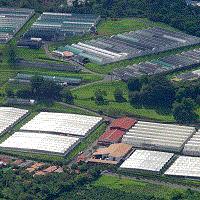
The new farm in Jalapa, Guatemala, will be called Innovaplant de Guatemala S.A. (Innovaplant is Kientzler’s young plant production division). They’re currently working on new construction and facility upgrades to assure the production standards for which Kientzler is known. Pilot production will start this fall, with commercial production starting in the Fall of 2026.
Byron Calderon will be general manager of the Innovaplant de Guatemala facility. He has a lot of experience in similar roles, as he held a similar position while at Ecke de Guatemala facility in the past.
Kientzler has been in Central America for 31 years, having established Innovaplant de Costa Rica in Sarchi, Costa Rica, in 1994.

80 Acres Farms acquires three new locations
Some struggle, while others capitalize on the struggle. That’s what you could say about the acquisition of three Kalera, Inc. vertical farms by Hamilton, Ohio-based vertical farm company 80 Acres Farms. 80 Acres recently announced the purchase of former Kalera locations in Atlanta, Houston and Denver. They also acquired all intellectual property associated with them. Kalera filed Chapter 11 way back in April 2023 and the assets were purchased in October 2023 by Lactuca Holdings, with private equity backing by Sandton Capital Partners. I guess they’re the ones who sold the three locations.
The newly acquired vertical farms will extend the company’s network of production facilities beyond Ohio and Kentucky, where they grow greens (including spinach), microgreens, tomatoes and herbs. 80 Acres also owns and operates R&D facilities in Arkansas, advanced systems and design field lab in the Netherlands, and advanced plant genetics facilities in Israel.
“National retailers and foodservice distributors are seeking partners that can consistently supply high-quality product through a national network of local farms,” said Mike Zelkind, CEO and co-founder of 80 Acres Farms in the press release. “At the same time, there has been significant capital invested in the controlled-environment agriculture sector over the last 10 years, creating an infrastructure of underutilized assets across the country. We are building a national network in a capital-efficient manner by combining our technology and operating strengths to revitalize these facilities.”
80 Acres Farms was founded by Mike and Tisha Livingston in 2015. Their branded salads, salad kits, herbs, microgreens and tomatoes are available at 1,500 retailers and restaurants across the United States.

Is peat moss an “et cetera”?
Over the past week or two, I’ve been hearing that some Canadian “agriculture” might get an exemption from President Trump’s proposed 25% tariffs. But what part of agriculture? Might peat moss be included in there somewhere?
I’ve been digging deep online to see what I might find and that’s how I found this Politico article. In it, House Ag Chair G.T. Thompson (R-Pa.) is said to have asked the White House for exemptions for agricultural inputs, as have other GOP lawmakers, including Sen. Chuck Grassley (R-Iowa) and Rep. Zach Nunn (R-Iowa).
The story then quotes Thompson saying, “I absolutely am weighing in [at the White House] … things like potash, nitrogen. I’d throw peat moss in there, too, because that’s important to horticulture and mushroom growers.”
Then I found another quote, this time in a Bloomberg piece, that doesn’t directly say peat moss, but hopefully hints at it:
Agriculture Secretary Brooke Rollins told Bloomberg News that “everything is on the table” and she is “hopeful” that the administration could decide on providing relief for the agricultural sector.
“As far as specific exemptions and carveouts for the agriculture industry, perhaps for potash and fertilizer, et cetera—to be determined,” Rollins said Wednesday at the White House. “We trust the president’s leadership on this. I know he is hyper focused on these communities.”
Further down, the Bloomberg piece also states:
Lawmakers from states with strong agriculture interests have pleaded with the administration to carve out tariff exemptions for fertilizers and other products that are critical for growing U.S. crops.
Hopefully, Mr. Thompson did throw in peat moss at the White House. And that Secretary’ Rollins’ “et cetera … and other products” includes peat.

A Canadian on tariffs
Last time, I gave you a little insight into the challenges we have reporting on things like tariffs before all the dust has settled and they’re fully in effect (or aren’t). I focused specifically on Canadian peat, a product we all use. Here’s a reply on the topic of tariffs from a Canadian grower, Steve Andersen of Andersen’s Nursery in Ladysmith, British Columbia:
Chris, first, the complexities of tariffs are way above my pay grade, but as a Canadian grower, I felt a need to comment on the peat tariff article.
As you might well imagine, the tariff story is much bigger in Canada than it is in the U.S., as virtually every industry will be affected if the U.S. implements across-the-board tariffs on all Canadian goods. In our industry, there are many items that cross the border in both directions and I fully suspect that reciprocal tariffs will be immediately implemented by Canada. There are growers in Canada that ship significant volumes of plants (and produce) south and American retailers that rely on Canadian-grown plants. There are also many Canadian retailers that are highly concerned that their tree and shrub supply will be 25% more expensive if reciprocal tariffs go through, while there are many American nurseries that rely on Canadian sales. Many of our seedlings currently come from the U.S. Many Canadian growers use U.S.-made plastics. Much of the U.S.-used fertilizers originate in Canada. Energy is another big component of our industry and it also flows both ways. Tags. Seed … I could go on.
For AmericanHort (of which we are a member) to lobby just against a tariff on peat moss, calling it a critical mineral (really?) and ignoring the fact that a tariff war will be bad for both countries and most facets of our industry, and many others, is short-sighted and blind of how interconnected our countries are. While there would be winners in a tariff war they would be far outnumbered by the losers on both sides of the border. I suspect that if the Trump Administration starts exempting certain critical imports from tariffs that Canada will simply apply an export tax on items that can’t be purchased elsewhere, as has been discussed. I should also point out that a 25% tariff on peat would not add 25% to the cost of finished media. A tariff is applied on the cost before freight (which is a large component of peat) and most other media ingredients originate in the U.S.

Looking for a new cash crop? How about vanilla beans?
Cannabis and hemp may not have worked out for many of you, but how about vanilla? The University of Florida (my alma mater) has been researching and breeding this useful orchid since 2017, looking at it as a possible replacement for citrus, which has been devastated over the past 30 years by citrus canker, citrus greening, freezes and developers. Vanilla orchids love the tropical heat and humidity of Florida's Zones 10 and 11.
Also, there’s very little domestic commercial production of the seed pods (vanilla “beans”), of which we import more than $194 million worth a year, mostly from Madagascar. Vanilla is used not just for flavoring, but also in cosmetics and medicines, and it's one of the most expensive spices on the market, hence the interest.
UF researchers have assembled a block of germplasm and are currently studying 27 varieties for their commercial potential, including disease resistance and bean production.
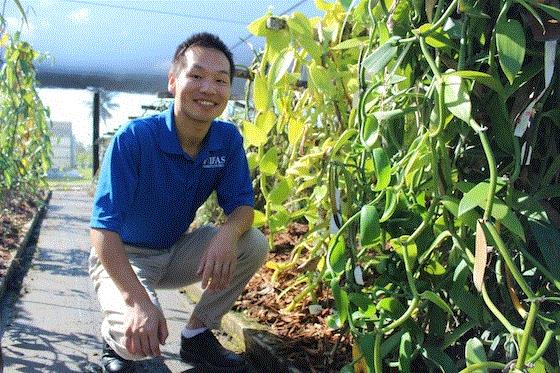 Xingbo Wu, a plant breeder and geneticist at the UF/IFAS Tropical Research and Education Center. (Credit: UF/IFAS Photography.)
Xingbo Wu, a plant breeder and geneticist at the UF/IFAS Tropical Research and Education Center. (Credit: UF/IFAS Photography.)
But here’s something funny: Market researchers at UF did a blind panel of consumers to see what sort of vanilla they preferred: from Madagascar, Papua New Guinea, Florida or a synthetic form of vanilla. Doggone if they didn’t prefer the fake stuff! They even said they’d pay for more it.
Their least favorite? The vanilla from Florida.
So they did another study using two groups of panelists to get their opinions on synthetic vanilla flavorings, a vanilla extract from Madagascar and two vanilla extracts from Florida. One group of consumers didn't know which vanilla was which; the others did know.
As with the first study, those in the blind group chose the synthetic stuff. But the group that knew what they were tasting chose the Florida extracts—and said they were willing to pay more for them!
What’s it mean? If we inform consumers about their options, they’ll chose domestic and natural.
And that takes marketing!

More on vanilla
Is vanilla a greenhouse crop or a field crop? Well, you can do it in shadehouses in the tropics—South Florida. But you can do it in a greenhouse, too, provided you supply some support fot the crop, as vanilla orchds are a vining crop that need to run for many feet to produce its seed pods.
I recall reading about a student at Cal-Poly named William Samson who was researching vanilla orchid production in greenhouses, so UF isn't alone. Then again, Wageningen University in the Netherlands abandoned its research into commercial vanilla production because while they could successfully grow the orchids and produce beans, they couldn't guarantee the quantity of harvest, which is necessary to make a good business case for a commercial crop. And yet Dutch edibles grower Koppert Cress has added vanilla to its greenhouse production, but they sell primarily to chefs in smallish quantities.
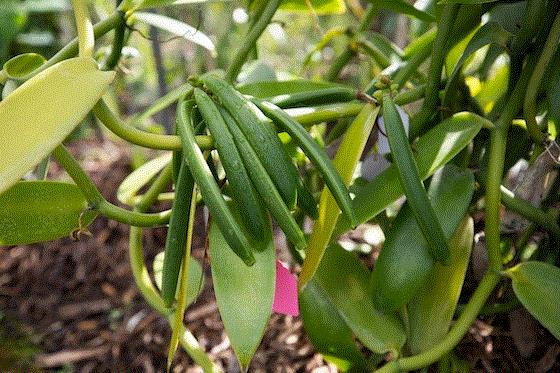
Back in Florida, tissue culture young plant producer AgriStarts introduced TC vanilla plants to the market this year at the Tropical Plant International Expo to go along with their many other edible crops from TC. I saw owner Ty Strode recently and asked him how the new vanilla orchid crop was going. “Sold out” was his reply.
That may be a regular answer for Ty if the interest in vanilla continues. As it might, with the first Florida Vanilla Conference taking place near Tampa April 12. Organized by the American Villa Association and hosted by Sunshine State Vanilla and The Tampa Greenhouses, the event will be a day of all things vanilla—leading voices in the industry, health and wellness benefits, how to grow the crop, the history of vanilla in Florida, a Vanilla Lab to experience various types of vanilla from around the world, a vanilla culinary experience, and more.

Being connected to your leaders pays off
Some businesspeople like to stay under the radar. Others, like Mike Gooder, owner and founder of Plantpeddler in Cresco, Iowa, do their best to be a giant blip on the radar screen—such as his non-stop communication with local and state politicians about the importance of horticulture as part of agriculture in Iowa. It’s led to numerous visits by the luminaries, and no doubt they’ve used what they’ve learned in Des Moines and D.C.
Most recently, it earned Plantpeddler the honor of being named Iowa’s Small Business of the Week by Senator Joni Ernst, who plans to recognize a small business in every one of Iowa’s 99 counties.
“Shipping over 15 million plants each year, Plantpeddler has rooted themselves as the go-to small business for all horticulture needs,” said Senator Ernst in her announcement. “From garden mums to begonias, Plantpeddler serves 3,200 growers domestically and abroad, leafing an impact felt far beyond Iowa.”
That’s great free publicity! If Mike and company had not been on the Senator’s radar, she wouldn’t have known Plantpeddler existed and the honor would have gone to Joe’s Attachments or Reno’s Roadkill Smokehouse.
Plantpeddler is in Howard County, the state’s 79th most populated county in Iowa, named for General Tilghman Ashurst Howard, a friend of Andrew Jackson and Sam Houston.

Finally …
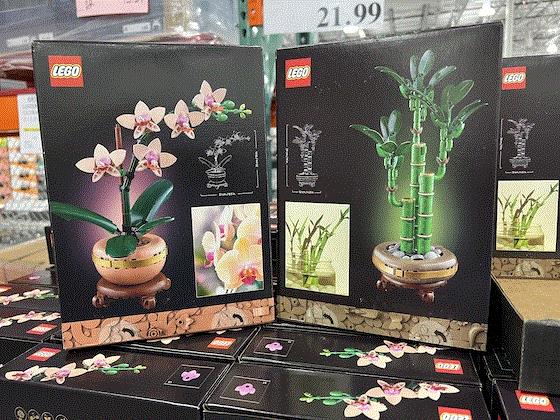
Remember this from a couple weeks ago? I speculated that it wasn’t just children assembling them. I was right.
My former Ball Publishing colleague Diane Blazek, now executive director of All-America Selections and National Garden Bureau, reports that her 30-year-old daughter (the doctor!) loves the Lego orchid her husband gave her for Valentine’s Day.
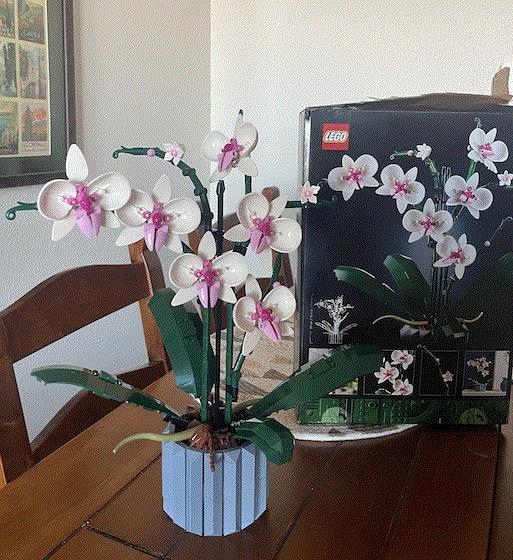
“We were even texting that the two of them, once they buy a house, would love a plant solarium or the like,” Diane wrote to me. “And, yes, they would be interested in trying their hand at growing orchids!”
Feel free to email me at beytes@growertalks.com if you have ideas, comments or questions.
See you next time!

Chris Beytes
Editor-in-Chief
GrowerTalks and Green Profit
This e-mail received by 29,711 loyal readers!
Thanks to my loyal sponsors, who help me reach the 29,711 readers of Acres Online in more than 60 countries. Want to be one of them (a sponsor, that is)? Give Kim Brown a shout and she will tell you about our many advertising opportunities.